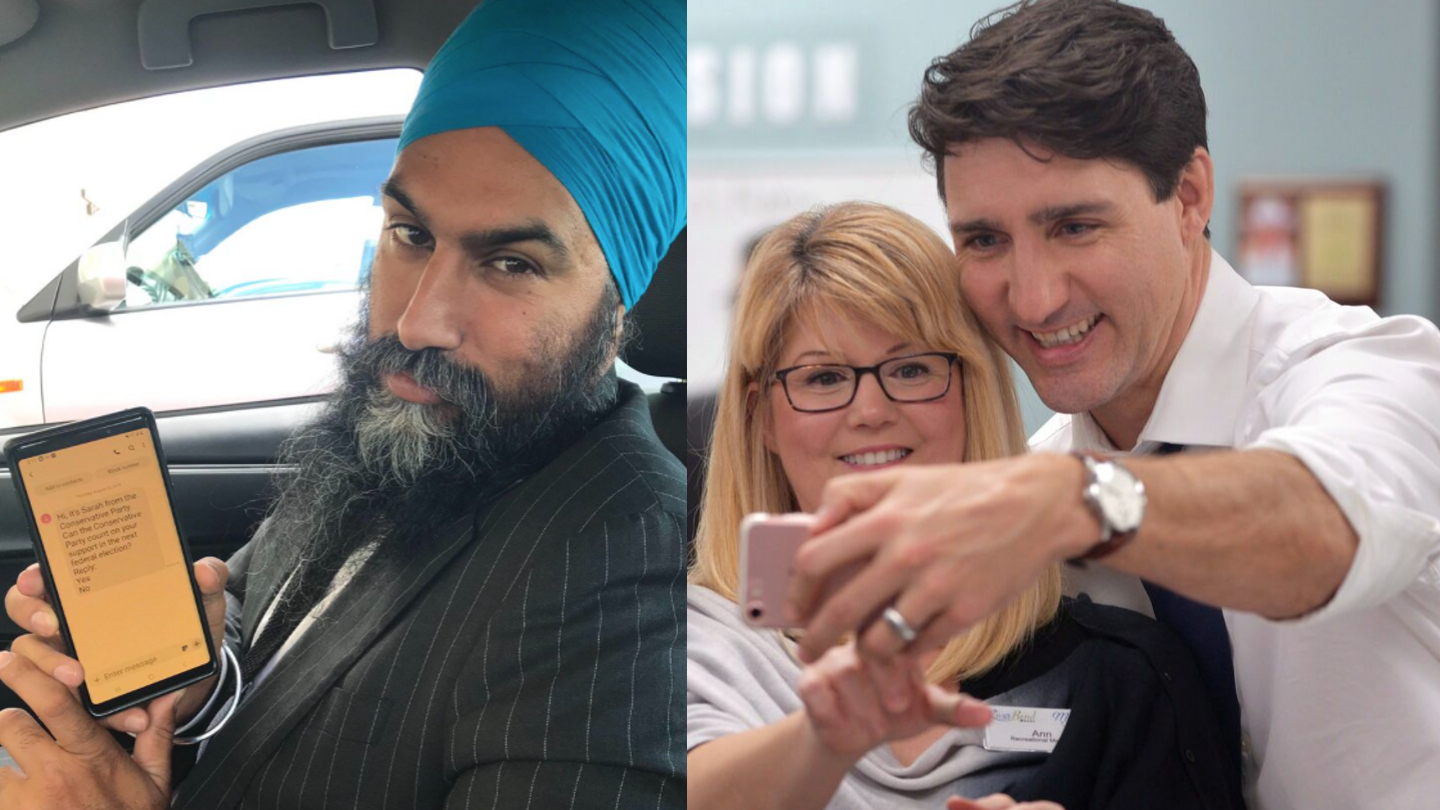Here Are Each Party’s Plans to Make Your Phone and Internet Cheaper

Credit to Author: Anne Gaviola| Date: Thu, 26 Sep 2019 18:14:58 +0000
Canadians pay some of the highest rates in the world for cellphone data and Canada’s political parties are finally starting to tackle that.
The average monthly cell phone bills is between $40 and $100, and our telecom companies are pocketing the highest revenue per gigabyte in the world.
Experts say it boils down to a lack of real competition. We’re in the grip of the “Big Three”—Bell, Rogers and Telus—which have captured 92 percent of the Canadian market (disclosure: VICE has a partnership with Bell Media).
Although only three of the four major parties have shared plans to tackle mobile and internet affordability, they are all light on specifics, and digital rights experts say they don’t go far enough.
Liberals
Liberal Leader Justin Trudeau pledged this week to reduce cellphone prices by 25 percent over four years, saving an average Canadian family $250 a year. He wasn’t clear on how that would happen, but said he would work with telecom companies to offer plans that are comparable to global prices.
Trudeau tweeted: “Groceries, cell phone bills, childcare, it all adds up. And in a country as prosperous as Canada, it shouldn’t be as tough as it is for some to make ends meet.”
The Liberal plan also includes opening up the market to Mobile Virtual Network Operators (MVNO), which lease wireless capacity at wholesale prices from established players and resell it at reduced retail prices. Right now, MVNOs operating in Canada are small players, and should not be confused with “flanker brands” of the Big Three, like Fido, which is owned by Rogers.
There’s a catch in the MVNO strategy though; the Liberals will allow “qualified” MVNOs. But they haven’t qualified what they mean by that.
NDP
Jagmeet Singh’s party proposes price caps on cellphone plans, similar to the Liberals 25 percent, which suggests savings of about $250 annually for Canadian families, and mandating unlimited data plans and accessible basic plan options.
It pledges to create a Telecom Consumers’ Bill of Rights designed to “put an end to the aggressive sales and services practices of big cell and internet companies.” It’s not clear how this would be enforced.
The NDP also wants to boost competition through MVNOs.
Greens
The Greens say “we need to disrupt the telecom monopoly.” They plan to push through reforms to Canadian laws to make it easier for new companies to take on the telecom giants, decouple phone payments from services, and create a universal broadband strategy to ensure high-speed internet access across the country. According to federal government figures, 97 percent of urban homes have access to high-speed internet while less than 40 percent of rural households do. Indigenous communities have a much lower rate, of less than 25 percent.
Conservatives
Andrew Scheer’s party has not made any commitments to improve cell phone affordability and internet access yet, though the party was quick to dunk on the Liberals’ record. A Conservative spokesperson told Global News, “The Trudeau Liberals have done nothing, and their heavy-handed regulatory approach will only reduce investment and lead to less service for Canadians.”
What digital rights experts think about the plans
Marie Aspiazu, digital rights campaigner at the advocacy group OpenMedia, is skeptical about the Liberals’ approach. “The Liberals say they’re going to work with Big Telecom to lower prices—I don’t buy that,” she said. “These are some of the greediest companies in Canada. They’re not going to lower their prices because the government kindly asked them to.”
Digital policy expert and University of Ottawa professor Michael Geist says the Liberal proposal contains “elements that are quite good,” but he’s not convinced that a 25 percent price reduction, which is what the NDP is offering as well, is enough. “If other countries are reducing it by 30 or 40 percent, during that same timeframe, then in fact Canadians fall even further behind from a global standpoint,” he said.
And while the Greens are hoping to make high-speed internet a thing in rural areas. Aspiazu says remote communities have been so far been forgotten by Big Telecom, which has no profit-incentive to invest there.
As for plans to include more MVNO involvement in Canada, Aspiazu is concerned that it won’t happen fast enough to make a real difference—or that the next government will limit it to MVNOs that already own a bit of spectrum, which doesn’t do much to boost competition.
A real solution
Aspiazu and Geist say the best way to bring down prices is to open the market up to foreign companies, the way that Australia has.
Canada, like Australia, is a geographically vast country with clusters of densely populated areas. Its main players include companies based in the U.K. and Germany, as well as home-grown service providers.
“When you embrace some of those large players, you often end up with other kinds of benefits—for example, roaming charges that are essentially free,” said Geist. “When you’re a big global player that manages networks around the world, you can offer up pricing that sometimes beats smaller domestic players. We don’t get anything like that here in Canada.”
Aspiazu says that increased competition means you can pay less for more in Australia. “I looked it up myself and for a Canadian plan that I’m paying $60 for 3GB [I can get] 80 GB in Australia for $55. It is ridiculous,” she said.
Follow Anne Gaviola on Twitter .